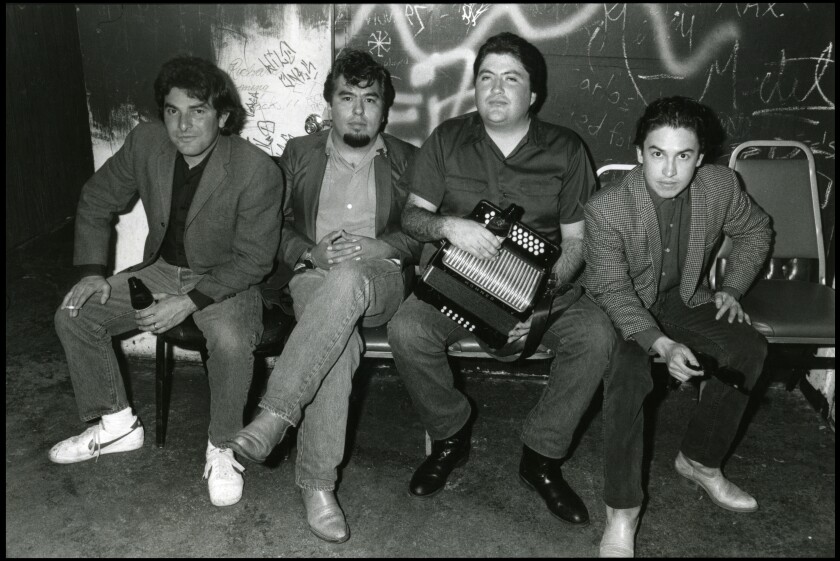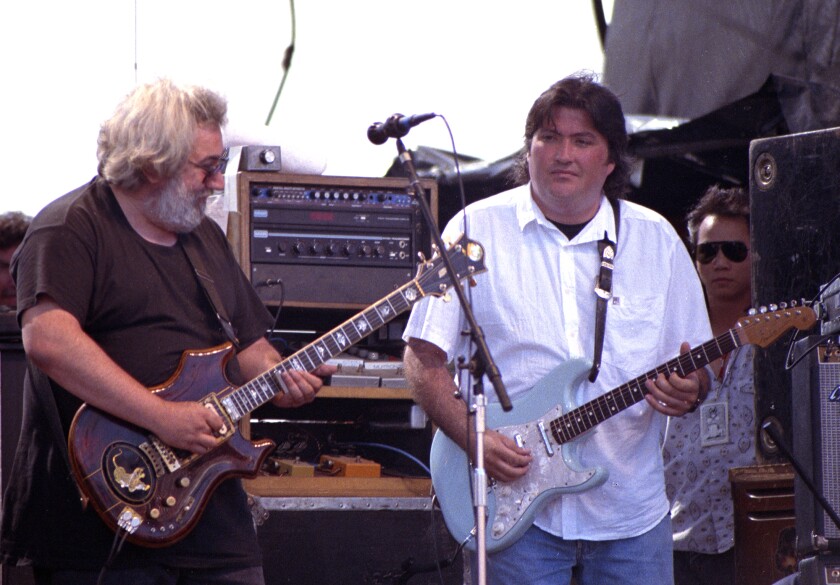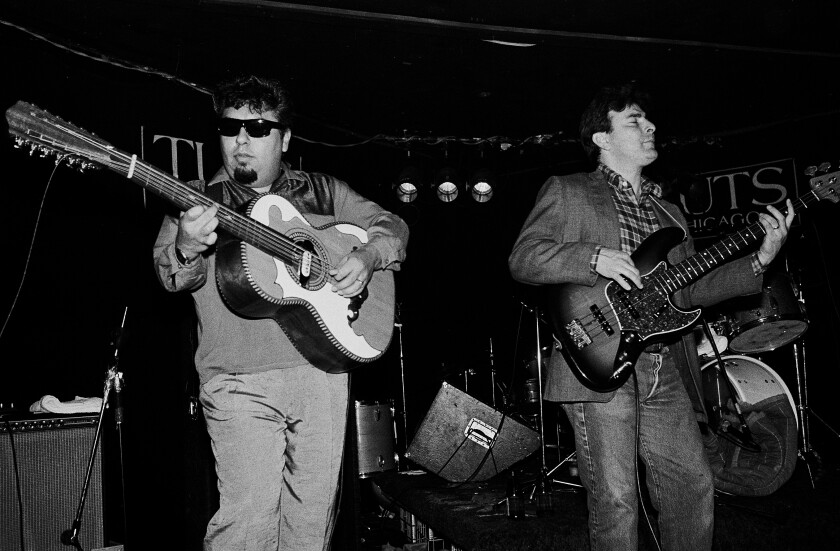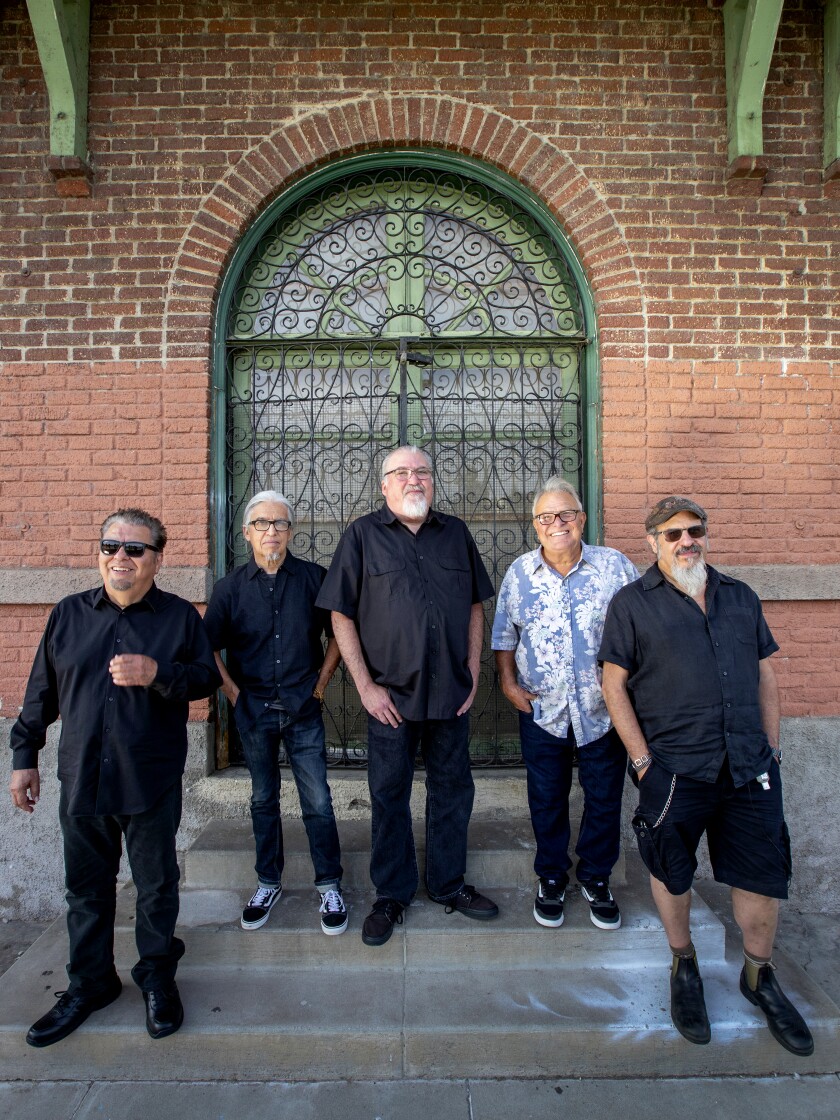Photo: Los Lobos, from left, is Cesar Rosas, Louie Pérez, David Hidalgo, Conrad Lozano and Steve Berlin.(Allen J. Schaben / Los Angeles Times)
Los Lobos nearly called it quits last year. Lucky for music-lovers everywhere, they made an album of covers instead
29 July 2021 | RANDALL ROBERTS | Los Angeles Times
Cesar Rosas had just finished strumming his guitar and singing the first lines of “The Star-Spangled Banner,” which the band would perform the next night to open a baseball game at Dodger Stadium, when he casually offered a concerning detail about the band’s status just prior to the pandemic.
“We were just about to throw in the towel and say, ‘Hey man, let’s slow down,’” said Rosas, 66, sitting at a table inside the community center at Plaza de la Raza in Lincoln Park flanked by his four Los Lobos bandmates of 40-plus years.
“We were working really hard,” added David Hidalgo, 66, who recalled being so exhausted early last year that he wondered to himself, “How much longer can we do this?” The coronavirus rendered the question moot, he said, noting after a comedic pause, “If it wasn’t for the impending doom, the vacation would have been great.”
As he says it, laughter fills the room, and it’s hard not to hear in it some sense of relief. In addition to the grind of touring, it’s been a challenging four years for America’s most prominent Mexican-American band.
Last week, the Grammy-winning Los Lobos — Rosas (guitar, bajo sexto, mandolin), Hidalgo (vocals, guitar, accordion), Louie Pérez (percussion, guitar), Conrad Lozano (bass, guitarrón) and Steve Berlin (saxophone, keyboards) — convened to talk about “Native Sons,” their new Los Angeles-themed covers album. Built in studio sessions during the 2020 shutdown, the project finds the quintet celebrating music made on its home turf.
Thee Midniters, the Blasters, Willie Bobo, War, the Beach Boys, Lalo Guerrero, Jackson Browne, Percy Mayfield, the Jaguars, the Blasters and more: “Native Sons” serves as an argument for, and an ode to, the L.A. sound — as translated by one of the city’s greatest ambassadors. That they recorded it during their longest respite from the road in four decades might have been unplanned, but the extended break helped tether the record.
The touring halt came after an average of 100 Los Lobos shows per year since 2000, part of a commitment stretching back to the band’s formation in the mid-1970s. “The longest we had gone from the very beginning without touring was probably a month, and in that month we were probably doing something,” noted Berlin, who officially joined the band in 1984 after playing with them for years.
For Pérez, 68, the time off meant that he “had to get used to not having to be somewhere in 45 minutes.” His wife, for example, makes pasta on Sundays and early on he jokingly made an observation about his former life. “I sat down with a plate and she said, ‘What are you waiting for?’ I said, ‘I’m waiting for it to get cold.’” Once Perez got used to the new routine, though, “It felt like those Saturday mornings when you were a kid and you wake up and think it’s a school day but you realize it’s not. It felt like that every day.”

The all-covers project relieved them of the need to compose new originals, allowing them to ponder their influences and to do so while isolating with their families, to whom in most years they said hello and goodbye dozens of times. “The guys are all grandfathers now, so they enjoyed just being around the kids on a regular basis. I got to hang out with my family,” said Berlin, who lives in Portland, Ore.
“Native Sons” is Los Lobos’ 17th studio album since its 1978 debut, “Just Another Band From East L.A.” Back then, they were Los Lobos del Este de Los Angeles and earned a living as an all-covers wedding band. By the time they released their debut EP, “… And a Time to Dance,” on Slash Records in 1983, they’d shortened their name as they broadened their aspirations.

(Gary Leonard / Corbis via Getty Images)
Their story has been told many times, most diligently in “Los Lobos: Dream in Blue,” writer Chris Morris’ 2015 biography: how the East L.A. band expanded into Hollywood and West Hollywood as part of the city’s punk and post-punk scene; how their 1984 album for Slash, “How Will the Wolf Survive?,” earned them national and international regard alongside label-mates X and the Blasters; how their 1987 version of Ritchie Valens’ “La Bamba” hit No. 1 on the pop charts; how they expanded their approach as their artistry improved on the dynamic 1990s albums “The Neighborhood” and “Kiko”; and how, much like the Grateful Dead, they’ve earned their livelihoods as a dynamic road band across their entire run.
“We don’t use a setlist most of the time. If it’s a loose setting, then we’ll just wing it,” Hidalgo told Relix magazine in 2015. “We’ll figure out maybe the first three songs and, from there, we’ll just try to read the crowd. If they shout out something, then we’ll play it.”
In operating this way, they’ve kept the wedding-band vibe going while revealing the depth of their musical passions. On various nights their repertoire has included songs by Joni Mitchell, Bob Marley, Santana, Vicente Fernández, Motörhead, the Grateful Dead, Richard and Linda Thompson, Neil Young, Sir Douglas Quintet, Desmond Dekker, Led Zeppelin, Buddy Holly, Elvis Costello, Tito Puente, the Meters, Freddy Fender, Merle Haggard, Sly & the Family Stone and dozens more.

(Tim Mosenfelder / Getty Images)
That versatility permeates “Native Sons.” Opening song “Love Special Delivery” is an amped-up take on an R&B song by Whittier band Thee Midniters. Jackson Browne’s “Jamaica Say You Will,” from his 1971 solo debut, is a lovely torch song. Lalo Guerrero’s fast-paced rhumba “Los Chucos Suaves” stars Berlin’s heavy baritone sax, a mess of polyrhythms and a Hidalgo solo that glides effortlessly across the measures. “Farmer John” sees Los Lobos revisiting one of the first songs they ever released.
“Jerry Garcia said that their version of [the Grateful Dead’s] ‘Bertha’ was his favorite,” says John Allen, president of Nashville-based New West Records, which is releasing “Native Sons.” Allen first worked with Los Lobos in the mid-1980s when he was at indie publishing company Bug Music and helped facilitate Waylon Jennings covering Los Lobos’ ”Will the Wolf Survive?”
Expecting that Los Lobos’ first record for New West would be an album of new material, Allen called their pitch for the covers album “a bit of a curveball.” After he, New West vice president of A&R Kim Buie and Los Lobos’ Berlin (who often serves as the point person on Los Lobos projects) met to discuss the L.A. theme, any hesitation vanished.
“If they’re inspired, you know it’s going to be good,” Allen said.

Buy Vinyl, CD and DL Native Sons on

“Honestly, not having a record deal wasn’t something we thought about,” Berlin said when asked about the New West deal. “Bands like us, well into our career, that’s not the be-all-end-all.”
Also not a prerequisite is a hyperactive social media presence, though during the forced sabbatical Los Lobos recorded a number of homemade missives, including one that celebrated Cinco de Mayo. Another encouraged fans to vote for Joe Biden in the presidential election. Such clips were meant to both connect with and advocate for their devoted fan base.
Lyricist and multi-instrumentalist Pérez, 68, said that such advocacy is ingrained in the band’s DNA. He cited as one example the lyrics for “A Matter of Time,” from “How Will the Wolf Survive?,” which he called “a song about an immigrant living in asylum across the border.”
“We’ve always been aware of the fact that there’s four brown faces onstage in Helsinki, Finland, or in Kyoto,” Pérez stressed. “It’s our responsibility to redefine a lot of the myths that people have heard about Mexican people — and continue to.”
Their Biden support was prompted by what they’d seen while touring, both before and after the Trump administration started blanketing America with anti-immigration rhetoric.

(Paul Natkin/Getty Images)
Their first American tour in 1984 was by van, Perez said, and their aim was to make an impression with audiences by celebrating the music that unified people. “We were on the road in Chapel Hill, N.C., Richmond, Va., and Burlington, Vt., and there wasn’t a Mexican person there if your life depended on it.”
He added, “They were there, but they were still in the shadows. We found them in the kitchens. They would come out during our soundcheck and say, ‘What’s going on here? There’s a Tex-Mex song and they’re singing in Spanish.’ We’d look on the side and all of the kitchen team would be there. You can imagine how they felt.”
Pérez called touring in the Trump years “us digging in and doing what we do best, which is play rock ’n’ roll — while keeping aware that, because of a divided America, our message was more important than ever.”

(Allen J. Schaben/Los Angeles Times)
That might be one reason why, instead of covering Latin-soul band War’s classic party jams “Lowrider” or “The Cisco Kid,” the band focused on the more politically charged “The World Is a Ghetto” for “Native Sons.” It also may be why they merged the long version of the bucolic Buffalo Springfield song “Bluebird” and the more protest-oriented “For What It’s Worth.” Asked if they embedded certain themes into the “Native Sons” song selection, the band didn’t have an easy answer — other than the easiest.
“Everybody picked a favorite song, or a song from a favorite band,” said bassist Conrad Lozano, 70, a Beach Boys fan who successfully lobbied for the inclusion of “Sail on, Sailor.” The striking rendition is one of the album’s highlights.
“There were certain bases we had to cover,” adds Hidalgo. “You had East L.A., the soul element, the Chicano or Mexican side of things, and the hippies and Laurel Canyon.”
“The city of L.A. really did birth us,” Berlin says. “Why not try something that says thank you with an homage to the people that inspired us? What could be cooler than that?”
That spirit permeates “Native Sons,” notes Dave Alvin, who co-founded the Blasters with his brother Phil Alvin. Los Lobos covers the Blasters’ early rocker “Flat Top Joint” on “Native Sons.” “The great thing about the album is how eclectic the band can be. They can be Thee Midniters or they can sound like Percy Mayfield’s backup band. They can sound like a traditional cumbia group and they can sound like the Buffalo Springfield.”
Alvin witnessed Los Lobos’ versatility as the band was blossoming, when Los Lobos started gigging with the Blasters at the Whisky A Go Go in the early 1980s. “Three-fourths of the audience were just like, ‘OK, great, man, let’s have fun.’ The other quarter of the audience was like deer in the headlights, especially when they put the accordion in there to play some of the norteños.” He added, “The people who loved them loved them instantly.”
Though you could be forgiven for thinking it was already a Los Angeles classic, the one original song on “Native Sons” is the band’s newly penned love letter to the city that birthed it.
Led by Hidalgo’s glorious tenor, “Native Son” illuminates a home where “there are concrete rivers flowing from the mountains to the sea” and “music playing on the radio from a house there down the street.”
Its refrain is as simple as it is true: “No matter where I lay my head / No matter how far I run / I dream about the day you’ll take me back / I’m your native son.”
Perez wrote the lyrics. “The song is a kind of tribute to L.A.,” he said. “We tried to create something that is us but that’s really not about us.”
Los Lobos still are:
David Hidalgo – vocals, guitars
Louie Pérez, Jr. – vocals, guitars
Cesar Rosas – vocals, guitars, bass, Hammond B3 organ
Conrad Lozano – vocals, bass
Steve Berlin – saxes, midisax, keyboards
Additional Musicians:
David Hidalgo, Jr. – Drums
Jason Lozano – Drums
Dannie Ramirez – Trombone
Camilo Quinones – Percussion
Phil Parlapiano – Keyboards
Dannie Ramirez – Trombone
Aaron Ballesteros – Drums
Little Willie G – Vocals
Jason G Backing – Vocals
Barrence Whitfield – Backing Vocals
Enrique “Bugs” Gonzalez – Backing Vocals

![]()
